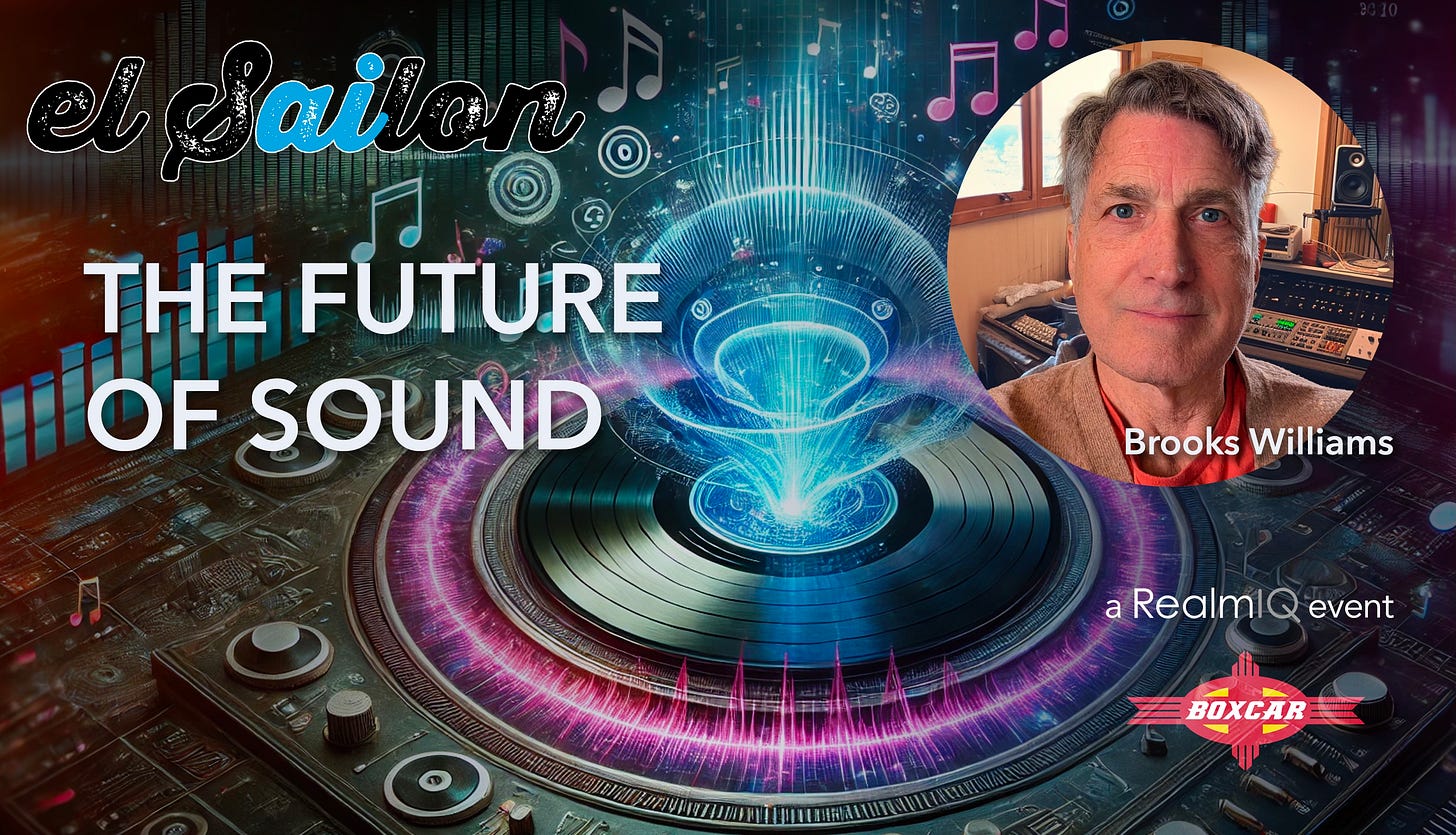Q&A with Andy Beach: Hollywood’s slow adoption of AI, governance concerns, Ethical AI, and copyright challenges
Curt: Welcome, everybody. We are well into our Season Three, and I'm excited to introduce today's guest—Andy Beach. Andy is a technology strategist, advisor, and author, specializing in the intersection of AI, media, and digital transformation. As the former CTO of Media & Entertainment at Microsoft, kind of a big name, kind of a big deal. Andy, welcome to the show. How are you doing?
Andy: Great! Thanks so much for having me on. I appreciate it.
Curt: Being a veteran at Microsoft—that's probably a whole other podcast. I remember working with Microsoft when I was at Universal Studios trying to launch HD-DVD, and Mark Turner, who’s been a guest on the show, was involved. Tell me, what's new for you now, and what's going on with AI in your world?
Andy: Well, going back to the Microsoft piece, I’m glad you even knew they had a media team—many people are surprised by that. Microsoft had a rich legacy in media before I got there: from inventing the VC-1 codec to pioneering adaptive streaming. That’s actually how I met them, back when I was in the startup world. It’s been fun transitioning out and focusing on the areas I’m most interested in. And right now, AI and media is such a hot intersection—content creation, production, monetization, supply chain, and even the viewer experience. It's everywhere.
Curt: Right. People don't realize they’re already interacting with AI on platforms like Alexa or Netflix recommendations.
Andy: Exactly. I think generative AI made people hyper-aware of AI, but machine learning has been quietly integrated into daily life for a long time—recommendation engines, automated transcripts, closed captions. Generative AI just ripped the Band-Aid off and made it personal—it sounds like you, writes like you—and that freaked people out.
Curt: I find it empowering, but not everyone agrees. There are so many copyright issues now—just look at the Miyazaki situation.
Andy: Yeah, it’s wild. Miyazaki was openly critical of AI, yet people scraped his work and replicated his style. We need to be cautious. I’m a tech optimist, but I fully recognize the dangers—weaponization, ethical pitfalls. It’s vital we understand how models are trained and where data comes from. Artists and authors must have the right to agree—or not—on whether their work is used for training AI.
Curt: Ironically, with billions being invested into AI, why can't some of that be diverted to proper licensing fees?
Andy: Exactly. The money is there. And yet, we’ve got leaders pushing for blanket “fair use” laws to avoid lawsuits. I’m not a lawyer, but I don’t believe scraping artists’ work falls under fair use. I think the EU is ahead of us in developing the policies needed here—we’ll likely follow rather than lead.
Curt: Sadly, I have no faith in our federal government to regulate this well. I think states will have to lead, and individuals must advocate—what I call “choices and voices.”
Andy: Totally agree. People need to speak up. But also, they shouldn’t disengage. If you’re not part of the conversation, you’ll have even less influence over how AI is implemented. It’s here to stay, so let’s guide it to a better future.
Curt: Absolutely. I often talk about the AI bubble—not the tech valuation bubble, but the AI adoption bubble. People are hungry to use these tools and that’s not slowing down.
Andy: Agreed. Adoption is still in early stages. AI is becoming more embedded in creative workflows, not just something you step out of your workflow to use. And with innovations like DeepSeek, the pace is accelerating. Things that once took years now happen in months. We’re not done with this innovation wave.
Curt: So true. The costs will come down, the tools will improve. Speaking of DeepSeek—how do you think the U.S. is doing in the AI race with China?
Andy: That’s a great question. I think of it more as a race than a war. China’s doing things more efficiently because they’ve had to, due to fewer resources. It’s unclear what kind of validation is being done on their models, but if we can globally agree on things like content provenance, we’ll be better able to compare quality and ethics.
Curt: Governance and provenance are so important, but challenging on a global scale. Business reality always seems to interfere with utopian ideals.
Andy: Exactly. It needs to be more balanced—we can’t achieve equity with a purely capitalist mindset.
Curt: I’m more of a solarpunk guy, hoping for an optimistic AI future rather than Skynet.
Andy: It's funny how often we go straight to Skynet. Entertainment has trained us to fear AI as the villain. But in reality, AI can be our assistant, our partner. It just depends how we implement it.
Curt: Speaking of Hollywood—you’ve worked closely with studios. Are they finally thawing toward AI?
Andy: Definitely. Studios have had AI in their production and archives for years, but generative AI made them pause. Now, we’re seeing governance boards being created—legal, HR, R&D, and production teams collaborating on AI strategy. They’re also figuring out how to educate their workforce. Indies move faster, of course, but studios are getting there.
Curt: Advertising seems to be further ahead—less red tape, faster adoption.
Andy: Yes. Advertising is definitely ahead. They’re not bound by unions, and they’re working directly with brands. That’s a model that studios can study.
Curt: A lot of agencies are nervous. VFX companies are folding. Creative shops are shrinking. Where do you see that sector heading?
Andy: The phrase I keep coming back to: AI won’t replace you, but someone using AI will. Creatives with classical training and a good grasp of AI will stand out. Yes, there’s disruption, but there’s also opportunity. Retraining is key. This is the next evolution, just like non-linear editing and digital cameras were decades ago.
Curt: So true. New level set. Those who embrace the tools and push creativity will thrive. That’s how creativity wins again.
Andy: Exactly. Agencies may shrink, but smaller ones may thrive by working with clients who couldn’t afford branding before. It’s a new model. Just like YouTubers created a whole new industry, AI will open up new paths we haven’t yet imagined.
Curt: What about music? You’ve worked with video—what are you seeing in the audio space?
Andy: A bit, yes. Music industry is being cautious, just like Hollywood. But virtual production is gaining traction—it reduces costs and makes more projects feasible. Live events are becoming more interactive, taking cues from sports leagues on data use and fan engagement.
Curt: And the estates? Like Elvis, Tupac, The Beatles?
Andy: Yes, companies like ReSpeecher are working with estates to recreate voices. It’s a long, hands-on process—very curated. But it’s happening, and it’s moving into medical applications too, like voice restoration for people who’ve lost their speech.
Curt: Fascinating. And what about avatars? I have one, I use it. What do you think?
Andy: Tons of use cases. News broadcasters, for example, can now generate content in multiple languages without needing the anchor to record each time. It’s empowering. I even used it internally at Microsoft for localization. It amplifies your voice and reach.
Curt: There's concern about too much content. But discovery is the bigger problem, right?
Andy: 100%. We’ve had too much content since cable TV. The key is helping people discover what matters to them. AI can play a huge role in fixing discovery. I'm surprised no one has cracked this yet—someone will.
Curt: Maybe Amazon and Alexa will lead. Maybe Apple. But we need more than a search engine—we need a curator.
Andy: Totally agree.
Curt: So as we wrap, where are you going to be next? What’s on your schedule?
Andy: I'm writing a lot on my Substack: abeach.substack.com. I’ll be at NAB next week on a couple panels—one with SMPTE and one with NAB around DeepSeek and ethical AI. I’ll also be speaking at Chapman University in April and DePaul University in May for their AI and Media Symposium.
Curt: Fantastic. Keep up the great work, Andy. We'd love to have you back. For those tuning in, follow us on your favorite podcast platforms—and now even on Blue Sky. Thanks so much, Andy. Take care!
Andy: Thank you, Curt. I’ll come back anytime.
To watch Andy’s interview on YouTube, click here. To listen to it on Spotify, click here. Stay tuned for more RealmIQ Sessions, Season 3. Follow us here or on TikTok, LinkedIn, and Bluesky, and don’t forget to subscribe!
New Announcements
I am excited to share that one of my favorite local DJ’s, Chris D. from KBAC, will host a live broadcast from BOXCAR on April, 8, 3-5pm, preceding THE FUTURE OF SOUND lecture with Brooks Williams at 5:30. It is not too late to RSVP Here.
Want to advertise in RealmIQ+ or our Podcast?
If your company is interested in reaching an audience of AI professionals and decision makers, you may want to advertise with us.
Check out my latest blog on the Miyazaki debacle here.













